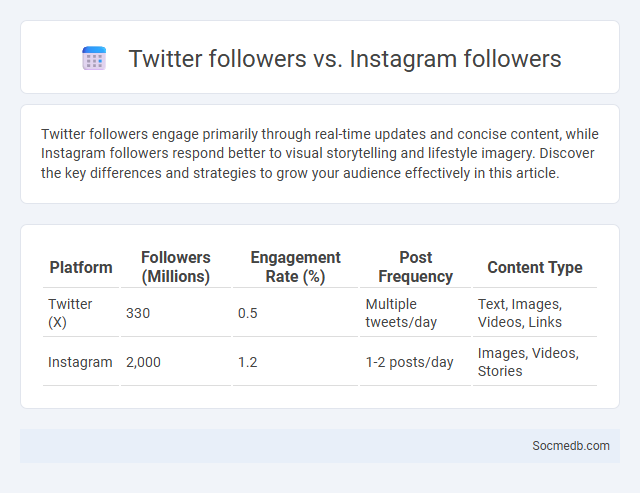
Photo illustration: Twitter followers vs Instagram followers
Twitter followers engage primarily through real-time updates and concise content, while Instagram followers respond better to visual storytelling and lifestyle imagery. Discover the key differences and strategies to grow your audience effectively in this article.
Table of Comparison
| Platform | Followers (Millions) | Engagement Rate (%) | Post Frequency | Content Type |
|---|---|---|---|---|
| Twitter (X) | 330 | 0.5 | Multiple tweets/day | Text, Images, Videos, Links |
| 2,000 | 1.2 | 1-2 posts/day | Images, Videos, Stories |
Understanding the Concept of Social Media Followers
Social media followers represent individuals who subscribe to a user's content, contributing to their online presence and influence. The number and engagement level of followers directly impact content visibility, brand reputation, and marketing reach on platforms like Instagram, Twitter, and Facebook. Understanding followers' demographics and behavior allows for tailored content strategies that enhance audience retention and growth.
Twitter Followers: Characteristics and Engagement
Twitter followers exhibit diverse characteristics, including demographics, interests, and activity levels, which influence their engagement patterns. Your content's relevance, timing, and interactivity significantly impact follower interaction, fostering retweets, replies, and likes. Understanding these factors helps optimize follower growth and enhances meaningful engagement on the platform.
Instagram Followers: Trends and Behavior
Instagram followers have grown significantly, with over 2 billion monthly active users engaging through stories, reels, and IGTV, driving shifts in digital marketing strategies. User behavior shows a preference for authentic content and micro-influencers, with engagement rates higher in niche communities compared to celebrity accounts. Trends indicate that follower growth is increasingly influenced by algorithmic visibility and interactive features such as polls, live sessions, and shopping tags.
Key Differences Between Twitter and Instagram Followers
Twitter followers often engage with real-time updates, news, and brief text-based content, favoring concise communication and hashtag-driven trends, while Instagram followers prioritize visual storytelling through high-quality images, videos, and stories that emphasize aesthetics and lifestyle. Twitter's audience demonstrates higher interaction with discussions, retweets, and replies, promoting active dialogue, whereas Instagram followers typically engage more through likes, comments, and shares focused on visual appeal and influencer marketing. The demographic on Instagram tends to skew younger and more lifestyle-oriented, whereas Twitter followers include a broader range of users interested in news, politics, and niche communities.
How Follower Count Impacts Social Influence
Follower count plays a crucial role in determining social influence on platforms like Instagram and Twitter, as higher numbers often correlate with increased visibility and credibility. Influencers with large followings attract brand partnerships and sponsorships, amplifying their ability to shape opinions and trends. Engagement rates, alongside follower count, further enhance perceived authority and trust within digital communities.
Audience Demographics: Twitter vs Instagram
Twitter's audience primarily consists of adults aged 25 to 40, with a strong presence of professionals and news enthusiasts, making it ideal for real-time updates and thought leadership content. Instagram attracts a younger demographic, mainly between 18 and 34 years old, with a high concentration of creative individuals and visual content consumers, perfect for brand storytelling through images and videos. Understanding these audience demographics helps tailor Your social media strategy to the platform where Your target users are most active and engaged.
Strategies to Grow Followers on Both Platforms
To grow followers on both Instagram and TikTok, consistently post high-quality, engaging content tailored to each platform's unique style and audience preferences. Use relevant hashtags, collaborate with influencers, and engage actively with your community through comments, stories, and live sessions to boost visibility. You can also analyze platform-specific insights to optimize posting times and content types, maximizing follower growth efficiently.
Quality vs Quantity: Evaluating Follower Value
Quality followers on social media drive higher engagement rates, authentic interactions, and increased trust, which contribute significantly to your brand's growth and credibility. Evaluating follower value means prioritizing active and relevant audiences over large but disengaged numbers, as genuine connections lead to better conversion and retention. Your strategy should focus on cultivating followers who align with your content and demonstrate consistent activity rather than merely chasing high follower counts.
Brand Opportunities Across Different Follower Bases
Brands can leverage social media platforms by tailoring content strategies to engage distinct follower demographics, maximizing reach and conversion rates. Micro-influencers with smaller, highly engaged audiences often drive authentic interactions and higher trust, while larger follower bases enable extensive brand visibility and mass awareness campaigns. Analyzing follower data across platforms allows brands to optimize targeting, enhance customer relationships, and boost overall marketing effectiveness.
Choosing the Right Platform to Build Your Followers
Selecting the ideal social media platform depends on target audience demographics, content type, and engagement goals. Instagram and TikTok excel for visual and short-form video content targeting younger users, while LinkedIn suits B2B networking and professional growth. Analyzing platform-specific analytics helps optimize content strategies to effectively grow and retain followers.
 socmedb.com
socmedb.com